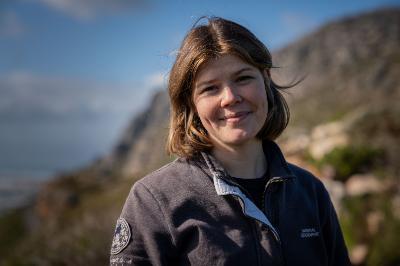Gabriella Leighton
 Postdoctoral Fellow:
Postdoctoral Fellow:
BSc, University Cape Town, 2014
PhD, University Cape Town, 2021
Email: gabi.leighton1@gmail.com
Supervisor: William Froneman
Project Title
Stable isotope analysis of marine subsidies in a terrestrial predator
Using stable isotope analysis to understanding patterns of foraging ecology of caracals around South Africa, with a focus on potential marine subsidies in coastal foraging caracals on the Cape Peninsula
Gabi is a recent PhD graduate with the Institute for Communities and Wildlife in Africa (iCWild) in the Biological Sciences Department, University of Cape Town. Born in London, UK, she grew up in Cape Town, South Africa passionate about wildlife, particularly wild cats, and decided to study zoology at a young age. She completed her Bachelor of Science Honours at the University of Cape Town, developing research interests in conservation biology, particularly how innovative use of technology can aid in data collection to inform this field. She was awarded the British Ecological Society's Robert May Prize for early career researchers for her paper that explores and validates the use of Google Images to collect data on visible traits of organisms. More recently, her work has focused on the exciting field of urban ecology. Her doctoral thesis was entitled “Living on the edge: Exploring the effects of urbanisation on the foraging ecology and ecotoxicology or caracals”. It explored how rapid urbanisation influences the ecology of the highly adaptable Cape Peninsula caracal, using both classic and new methods. Her PhD work allowed further investigation into the costs and benefits of foraging at the interface between protected areas and the urban edge by quantifying environmental pollutant exposure and identifying potential exposure routes. Gabi was awarded funding from the WWF's Table Mountain Fund to support her environmental toxicant testing work. She is continuing her research on Cape Town caracals in her current position as a Post-doctoral Fellow with Rhodes University, and is still based in Cape Town, where she is the local coordinator for the Urban Caracal Project.
Research Interests
Urban ecology
Carnivore ecology
Marine subsidies
Ecotoxicology
Stable isotope ecology
Links
Recent Publications
- Leighton G.R.M., Bishop J.M., Camarero, P., Mateo, R. O’Riain, M. J., & Serieys, L.E.K. (2022) Poisoned chalice: Use of transformed landscapes associated with increased persistent organic pollutant concentrations and potential immune effects for an adaptable carnivore. Sci Total Environ. doi.org/10.1016/j.scitotenv.2022.153581
- Ratnayaka, A.A.W., Serieys, L.E.K., Prasad, T., Leighton, G.R.M., Sanderson, J. G. & Leung, L. K.P. (2021) Urban habitat use and home ranges of fishing cats in Colombo, Sri Lanka. Mamm Biol. https://doi.org/10.1007/s42991-021-00198-z
- Leighton G. R. M., Bishop J. M., Merondun J., Winterton, D. J., O’Riain, M. J., & Serieys, L.E.K. (2021) Hiding in plain sight: risk mitigation by a cryptic carnivore foraging at the urban edge. Anim Conserv 1–15. doi: 10.1111/acv.12732
- Leighton, G.R.M., Bishop, J.M., O’Riain, M.J., Broadfield, J., Merondun, J., Avery, G., Avery, D. M. and Serieys, L.E.K. (2020) An integrated dietary assessment increases feeding event detection in an urban carnivore. Urb Ecosyst. doi:10.1007/s11252-020-00946-y
- Leighton, G. R. M., Hugo, P. S., Roulin, A. and Amar, A. (2016), Just Google it: assessing the use of Google Images to describe geographical variation in visible traits of organisms. Methods Ecol Evol, 7: 1060–1070. doi:10.1111/2041-210X.125
Last Modified: Thu, 07 Jul 2022 14:17:34 SAST


